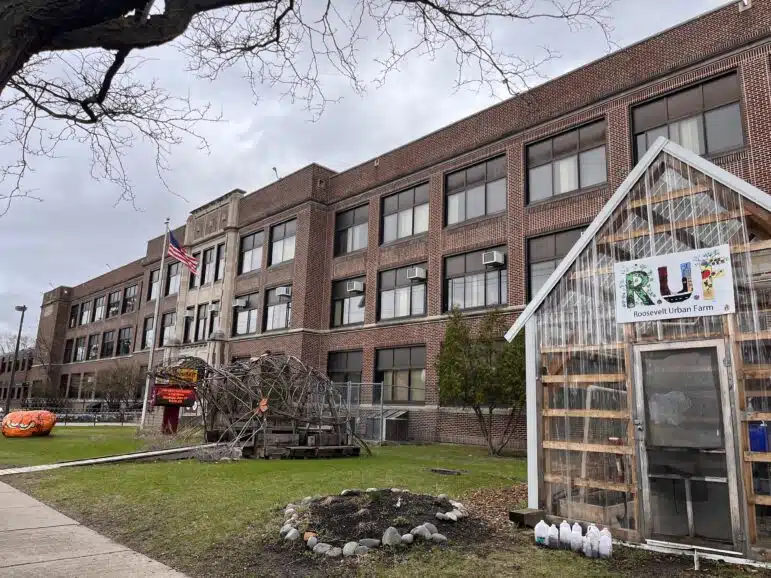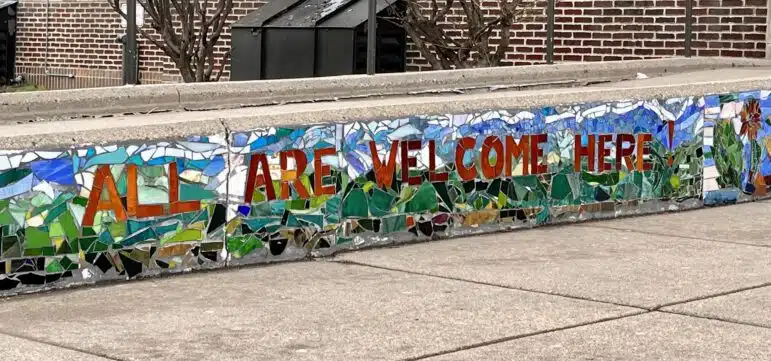Student Peace Advisory Groups Reimagine School Safety
In 2021, NP and Minneapolis Public Schools announced their first student peace advisory group for the Building Peaceful Schools project. The advisory group works with school staff, administrators, and NP to voice safety concerns and co-create the school safety and security system. This group represents a new vision for school safety that school districts in Minnesota and around the country are working to implement—a vision that is not based in the use or threat of force, but rooted in relationships.
From “Calls for Change” to Action
Following a years-long campaign by students and families to remove police from schools, Minneapolis Public Schools (MPS) broke its contract with the Minneapolis Police Department in June of 2020.
Recent research conducted by psychologist Shabnam Javdani revealed that the presence of school police officers in schools has significantly negative impacts on students overall. These impacts include a reduced sense of school community, heightened use of disciplinary measures that exclude students, increased arrests of children on school grounds, decreases in academic achievement, and amplified racial biases that are unrelated to students’ behavior.
Students and parents acknowledge that police officers alleviate some of their concerns when it comes to incidents around targeted violence and school shootings. But, more notably, policing schools doesn’t have any proven effect in deterring school violence, gun violence, or mass shootings.
The historic split from the Minneapolis Police Department has created a moment for reflection and an opening for MPS. Schools are now taking a closer look at how they define safety and determining conditions that lend themselves to student success, growth, and well-being. The district has also had to consider how to ensure staff and admin are equipped to cultivate a safe environment.
Staff and Students Learn Skills for Peace
In Minneapolis, NP works alongside MPS and the school community to build safer, more peaceful schools. Rather than focusing on punishing and potentially criminalizing student behavior, this project equips school admin with strategies to decrease conflict. One piece of that work involves strengthening staff’s skills in relationship-building, violence monitoring, and de-escalation tactics.
Brandon Krona is the Building Peaceful Schools Project Coordinator for MPS. While it’s imperative that staff and school admin are properly trained in these strategies, Krona believes there is also a shift in power dynamics required to truly create safer schools. And that’s where the student peace advisory group comes in.
He shared, “Kids at a young age are so full of life, they have so much energy and have a lot more to say. As they grow older their voices stay the same, but the rules and systems slowly shut them down. This program is going to allow those voices to emerge from the shadows of the rules and regulations that have shaped their schools and communities without them. They will not be unheard anymore, and we want their voices more than ever; considering they are the reason MPS exists. There’s the saying, ‘Kids First’— if we believe in that then we should have no problem having them help lead the way in creating safer schools and communities in our district.’’
The student peace advisory group is striving to enhance their self-awareness and their ability to de-escalate themselves and others. Students are also trained on protective accompaniment and provided additional information around identifying and cultivating healthy relationships.
Students Resolve Conflict Nonviolently
The NP team works alongside MPS’s Brandon Krona and staff members in the implementation of the Building Peaceful Schools programming and guidance of the founders of the student group. NP worked closely with students and staff for over a year and noted that students have taken great initiative in sustaining the student peace group.
Initially, students were sceptical about the effectiveness of being advisers. But, through initial trainings from NP and skilful accompaniment by MPS staff, they have begun to observe the impact of improved communication. Recent recruitment efforts by the student advisory group for the next school year have been very promising.
Students are also becoming more vulnerable with one another and take time to listen to each other while remaining open to other’s perspectives. These high schoolers are engaging in deep conversations around divisive issues—issues that would’ve previously resulted in a physical fight. Instead, they are having difficult discussions while centering each other’s humanity with respect and empathy.
Additionally, members of the student group have been able to put their new skills such as de-escalation and situational awareness into practice. Most notably, students have become more confident in their ability to address conflicts and prevent them from escalating into violence.
After a full-day training in holistic safety and security with NP, one high school senior ('22) shared the following reflection, “Our biggest takeaway has been learning the skills to resolve conflict in a peaceful manner. There were resolutions that were made, which really help us to see what we’re working towards.” She continued, “The training helped me understand myself better. It made me look at situations that I find myself in from a different perspective.”



